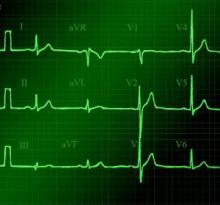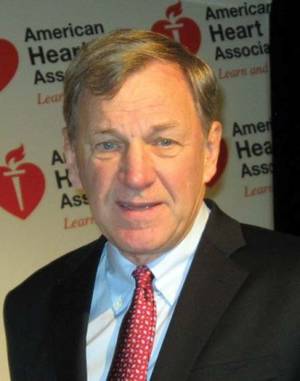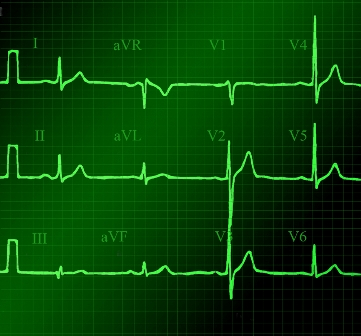User login
Screening asymptomatic adults for heart disease with an electrocardiogram provides little useful risk information but may cause substantial harm, according to a new recommendation by the United States Preventive Services Task Force.
A thorough history and physical exam are the best ways to ascertain risk, wrote task force chair Dr. Virginia A. Moyer and her fellow panel members.
"The incremental information offered by resting or exercise ECG (beyond that obtained with conventional CHD risk factors) is highly unlikely to result in changes in risks stratification that would prompt interventions and ultimately reduce CHD-related events."
However, the harms may be very real, noted Dr. Moyer of the Baylor College of Medicine, Houston, and her coauthors.
"An ECG abnormality, as a result of a true- or false-positive test, can lead to invasive confirmatory testing and treatments that have the potential for serious harm, including unnecessary radiation exposure and the associated risk for cancer," the panel members noted (Ann. Intern. Med.; 2012 July 31 [online first]).
Invasive testing – angiography and revascularization – could confer an additional set of problems, including bleeding, contrast-induced nephropathy, and allergic reactions to contrast agents.
The new recommendation is an update of one made in 2004. At that time, the task force advised against resting or exercise ECG and electron-based computer tomography (EBCT), but said there was not enough evidence to weigh in on ECG screening. The new paper included more recent data on direct harm due to the ECG itself, physical adverse events related to any additional testing, and psychological issues related to screening, including anxiety.
The guide also discourages baseline ECGs. "Performing baseline ECG so that results may be compared with future ECG findings is considered screening ... and is not recommended for asymptomatic adults at low risk for CHD," the authors cautioned. "There is insufficient evidence about its usefulness in adults at increased risk."
The recommendation also addresses ECG screening in adults who are at intermediate or high risk of heart disease, because these people would potentially reap the greatest benefit from early detection and intervention.
"Reclassification into a higher risk category might lead to more intensive medical management that could lower the risk for CHD events, but it might also result in harms, including medication adverse events such as gastrointestinal bleeding and hepatic injury," the panel noted. "The risk-benefit tradeoff would be most favorable if persons can be accurately reclassified from intermediate to high risk."
Adults who are known to be at high risk should already be receiving intensive risk factor modification, so a resting or exercise ECG would probably not change that management.
"Irrespective of ECG findings, asymptomatic adults at increased risk for CHD are usually managed with a combination of aspirin, hypertension management, and tobacco cessation," the authors said.
The new recommendation differs slightly from that of the American College of Cardiology Foundation and the America Heart Association. Their guideline suggests that screening is "reasonable" in asymptomatic adults who have hypertension or diabetes.
Those groups support the concept of an exercise ECG for those at intermediate risk – including sedentary adults who are starting an exercise program.
The American Academy of Family Physicians does not recommend a routine ECG in the periodic health exams of asymptomatic adults.
As members of a federal group, none of the task force participants has any financial declarations. Dr. Golden said has no relevant financial disclosures.
The USPSTF recommendations against screening asymptomatic
adults with resting or exercise ECGs for prediction of CHD events differs from
the current ACC/AHA guidance stating that such screening is “reasonable in
asymptomatic adults who have diabetes or hypertension.”
Like the recent recommendations from the USPTSF
discouraging breast mammography screening in younger women or routine prostate-specific
antigen levels in males, these new recommendations regarding ECG screening
result from insufficient evidence to assess the balance of harms, benefits, and
cost.
Dr. N. A. Mark Estes III |
All clinicians recognize that clinical decisions for the
individual patient involve more considerations than evidence alone. While
physicians should practice evidence based medicine when available, most of the
current guidelines in contemporary cardiology are not based on multiple
clinical trials or meta-analyses, which constitute the highest level of
evidence (Level A).
Whether resting or exercise ECGs provide incremental
information to conventional risk factor assessment for CHD remains unknown.
More robust studies assessing the risks, benefits, and cost of ECG screening
are needed.
In the meantime, clinicians should make individualized
decisions, being mindful of not only these new recommendations, but also their
own experience and judgment.
N. A. Mark Estes III, M.D., is professor of medicine at Tufts University
School of Medicine and is
a member of the Cardiology
News Editorial Advisory Board.
The USPSTF recommendations against screening asymptomatic
adults with resting or exercise ECGs for prediction of CHD events differs from
the current ACC/AHA guidance stating that such screening is “reasonable in
asymptomatic adults who have diabetes or hypertension.”
Like the recent recommendations from the USPTSF
discouraging breast mammography screening in younger women or routine prostate-specific
antigen levels in males, these new recommendations regarding ECG screening
result from insufficient evidence to assess the balance of harms, benefits, and
cost.
Dr. N. A. Mark Estes III |
All clinicians recognize that clinical decisions for the
individual patient involve more considerations than evidence alone. While
physicians should practice evidence based medicine when available, most of the
current guidelines in contemporary cardiology are not based on multiple
clinical trials or meta-analyses, which constitute the highest level of
evidence (Level A).
Whether resting or exercise ECGs provide incremental
information to conventional risk factor assessment for CHD remains unknown.
More robust studies assessing the risks, benefits, and cost of ECG screening
are needed.
In the meantime, clinicians should make individualized
decisions, being mindful of not only these new recommendations, but also their
own experience and judgment.
N. A. Mark Estes III, M.D., is professor of medicine at Tufts University
School of Medicine and is
a member of the Cardiology
News Editorial Advisory Board.
The USPSTF recommendations against screening asymptomatic
adults with resting or exercise ECGs for prediction of CHD events differs from
the current ACC/AHA guidance stating that such screening is “reasonable in
asymptomatic adults who have diabetes or hypertension.”
Like the recent recommendations from the USPTSF
discouraging breast mammography screening in younger women or routine prostate-specific
antigen levels in males, these new recommendations regarding ECG screening
result from insufficient evidence to assess the balance of harms, benefits, and
cost.
Dr. N. A. Mark Estes III |
All clinicians recognize that clinical decisions for the
individual patient involve more considerations than evidence alone. While
physicians should practice evidence based medicine when available, most of the
current guidelines in contemporary cardiology are not based on multiple
clinical trials or meta-analyses, which constitute the highest level of
evidence (Level A).
Whether resting or exercise ECGs provide incremental
information to conventional risk factor assessment for CHD remains unknown.
More robust studies assessing the risks, benefits, and cost of ECG screening
are needed.
In the meantime, clinicians should make individualized
decisions, being mindful of not only these new recommendations, but also their
own experience and judgment.
N. A. Mark Estes III, M.D., is professor of medicine at Tufts University
School of Medicine and is
a member of the Cardiology
News Editorial Advisory Board.
Screening asymptomatic adults for heart disease with an electrocardiogram provides little useful risk information but may cause substantial harm, according to a new recommendation by the United States Preventive Services Task Force.
A thorough history and physical exam are the best ways to ascertain risk, wrote task force chair Dr. Virginia A. Moyer and her fellow panel members.
"The incremental information offered by resting or exercise ECG (beyond that obtained with conventional CHD risk factors) is highly unlikely to result in changes in risks stratification that would prompt interventions and ultimately reduce CHD-related events."
However, the harms may be very real, noted Dr. Moyer of the Baylor College of Medicine, Houston, and her coauthors.
"An ECG abnormality, as a result of a true- or false-positive test, can lead to invasive confirmatory testing and treatments that have the potential for serious harm, including unnecessary radiation exposure and the associated risk for cancer," the panel members noted (Ann. Intern. Med.; 2012 July 31 [online first]).
Invasive testing – angiography and revascularization – could confer an additional set of problems, including bleeding, contrast-induced nephropathy, and allergic reactions to contrast agents.
The new recommendation is an update of one made in 2004. At that time, the task force advised against resting or exercise ECG and electron-based computer tomography (EBCT), but said there was not enough evidence to weigh in on ECG screening. The new paper included more recent data on direct harm due to the ECG itself, physical adverse events related to any additional testing, and psychological issues related to screening, including anxiety.
The guide also discourages baseline ECGs. "Performing baseline ECG so that results may be compared with future ECG findings is considered screening ... and is not recommended for asymptomatic adults at low risk for CHD," the authors cautioned. "There is insufficient evidence about its usefulness in adults at increased risk."
The recommendation also addresses ECG screening in adults who are at intermediate or high risk of heart disease, because these people would potentially reap the greatest benefit from early detection and intervention.
"Reclassification into a higher risk category might lead to more intensive medical management that could lower the risk for CHD events, but it might also result in harms, including medication adverse events such as gastrointestinal bleeding and hepatic injury," the panel noted. "The risk-benefit tradeoff would be most favorable if persons can be accurately reclassified from intermediate to high risk."
Adults who are known to be at high risk should already be receiving intensive risk factor modification, so a resting or exercise ECG would probably not change that management.
"Irrespective of ECG findings, asymptomatic adults at increased risk for CHD are usually managed with a combination of aspirin, hypertension management, and tobacco cessation," the authors said.
The new recommendation differs slightly from that of the American College of Cardiology Foundation and the America Heart Association. Their guideline suggests that screening is "reasonable" in asymptomatic adults who have hypertension or diabetes.
Those groups support the concept of an exercise ECG for those at intermediate risk – including sedentary adults who are starting an exercise program.
The American Academy of Family Physicians does not recommend a routine ECG in the periodic health exams of asymptomatic adults.
As members of a federal group, none of the task force participants has any financial declarations. Dr. Golden said has no relevant financial disclosures.
Screening asymptomatic adults for heart disease with an electrocardiogram provides little useful risk information but may cause substantial harm, according to a new recommendation by the United States Preventive Services Task Force.
A thorough history and physical exam are the best ways to ascertain risk, wrote task force chair Dr. Virginia A. Moyer and her fellow panel members.
"The incremental information offered by resting or exercise ECG (beyond that obtained with conventional CHD risk factors) is highly unlikely to result in changes in risks stratification that would prompt interventions and ultimately reduce CHD-related events."
However, the harms may be very real, noted Dr. Moyer of the Baylor College of Medicine, Houston, and her coauthors.
"An ECG abnormality, as a result of a true- or false-positive test, can lead to invasive confirmatory testing and treatments that have the potential for serious harm, including unnecessary radiation exposure and the associated risk for cancer," the panel members noted (Ann. Intern. Med.; 2012 July 31 [online first]).
Invasive testing – angiography and revascularization – could confer an additional set of problems, including bleeding, contrast-induced nephropathy, and allergic reactions to contrast agents.
The new recommendation is an update of one made in 2004. At that time, the task force advised against resting or exercise ECG and electron-based computer tomography (EBCT), but said there was not enough evidence to weigh in on ECG screening. The new paper included more recent data on direct harm due to the ECG itself, physical adverse events related to any additional testing, and psychological issues related to screening, including anxiety.
The guide also discourages baseline ECGs. "Performing baseline ECG so that results may be compared with future ECG findings is considered screening ... and is not recommended for asymptomatic adults at low risk for CHD," the authors cautioned. "There is insufficient evidence about its usefulness in adults at increased risk."
The recommendation also addresses ECG screening in adults who are at intermediate or high risk of heart disease, because these people would potentially reap the greatest benefit from early detection and intervention.
"Reclassification into a higher risk category might lead to more intensive medical management that could lower the risk for CHD events, but it might also result in harms, including medication adverse events such as gastrointestinal bleeding and hepatic injury," the panel noted. "The risk-benefit tradeoff would be most favorable if persons can be accurately reclassified from intermediate to high risk."
Adults who are known to be at high risk should already be receiving intensive risk factor modification, so a resting or exercise ECG would probably not change that management.
"Irrespective of ECG findings, asymptomatic adults at increased risk for CHD are usually managed with a combination of aspirin, hypertension management, and tobacco cessation," the authors said.
The new recommendation differs slightly from that of the American College of Cardiology Foundation and the America Heart Association. Their guideline suggests that screening is "reasonable" in asymptomatic adults who have hypertension or diabetes.
Those groups support the concept of an exercise ECG for those at intermediate risk – including sedentary adults who are starting an exercise program.
The American Academy of Family Physicians does not recommend a routine ECG in the periodic health exams of asymptomatic adults.
As members of a federal group, none of the task force participants has any financial declarations. Dr. Golden said has no relevant financial disclosures.
FROM THE ANNALS OF INTERNAL MEDICINE


